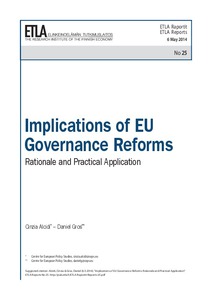Implications of EU governance reforms: rationale and practical application
"We consider the real life implementation of some key elements of the new economic governance framework for the euro area. The main findings are the following. The Country Specific Recommendations issued in the context of the European Semester seem to be too little ‘specific’ to constrain gover...
| Main Authors: | , , |
|---|---|
| Institution: | ETUI-European Trade Union Institute |
| Format: | TEXT |
| Language: | English |
| Published: |
Helsinki
2014
ETLA |
| Subjects: | |
| Online Access: | https://www.labourline.org/KENTIKA-19119986124919371689-implications-of-eu-governance-.htm |
| _version_ | 1771659892809007105 |
|---|---|
| author | Research Institute of the Finnish Economy, Helsinki Alcidi, Cinzia Gros, Daniel |
| author_facet | Research Institute of the Finnish Economy, Helsinki Alcidi, Cinzia Gros, Daniel |
| collection | Library items |
| description | "We consider the real life implementation of some key elements of the new economic governance framework for the euro area. The main findings are the following. The Country Specific Recommendations issued in the context of the European Semester seem to be too little ‘specific’ to constrain governments in general and even less creditor governments, who so far have been able to ignore them. We argue that the Excessive Imbalances Procedure should be based much more on forward looking variables and on deviations from the euro area average instead of absolute thresholds. The emphasis on cyclically adjusted balances in the reformed Stability and Growth Pact, as well as the Fiscal Compact (formally the TSCG) will face serious problems of implementation given the uncertainties surrounding the estimates of the cyclical component and the frequent revisions this component is subject to. Finally we show that the rationale for fiscal policy coordination, namely spill-over effects from national actions to the rest of the euro area, change nature in different economic circumstances. During a financial crisis much more coordination is desirable than during normal times. This implies that the set of ambitious rules for economic policy coordination created under the impression of the euro crisis might not be appropriate for different circumstances." |
| format | TEXT |
| id | 19119986124919371689_cbfe5db311df4e078101cb4989c178d2 |
| institution | ETUI-European Trade Union Institute |
| is_hierarchy_id | 19119986124919371689_cbfe5db311df4e078101cb4989c178d2 |
| is_hierarchy_title | Implications of EU governance reforms: rationale and practical application |
| language | English |
| physical | 26 p. Digital |
| publishDate | 2014 |
| publisher | Helsinki ETLA |
| spellingShingle | Research Institute of the Finnish Economy, Helsinki Alcidi, Cinzia Gros, Daniel economic recession EMU European Union fiscal policy governance structural adjustment Implications of EU governance reforms: rationale and practical application |
| thumbnail | https://www.labourline.org/Image_prev.jpg?Archive=109325792750 |
| title | Implications of EU governance reforms: rationale and practical application |
| topic | economic recession EMU European Union fiscal policy governance structural adjustment |
| url | https://www.labourline.org/KENTIKA-19119986124919371689-implications-of-eu-governance-.htm |

